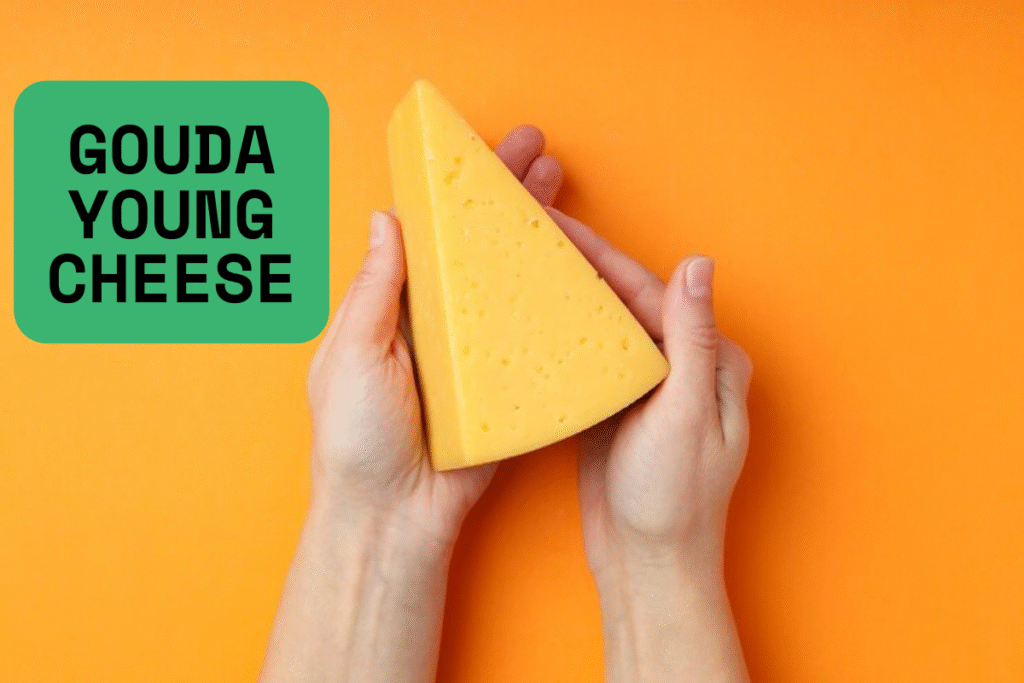Overview
Gouda cheese is one of the most beloved and widely consumed cheeses globally. But did you know that the flavor and texture of Gouda vary significantly based on its age? While aged Gouda gets a lot of attention for its caramel notes and crystalized crunch, young Gouda offers an entirely different cheese experience—mild, creamy, and versatile.
In this article, we’ll dive deep into what makes Gouda young so unique, how it’s made, its best culinary uses, nutritional value, and much more. Whether you’re a cheese connoisseur or just getting started with artisan cheeses, this guide will offer valuable insights and help you get the most from this delicious Dutch classic.
What is Young Gouda?
H2: Understanding Gouda Cheese
Gouda (pronounced “HOW-da” in Dutch) originates from the Netherlands and is named after the city of Gouda, where it was historically traded. It’s a semi-hard to hard cheese made from cow’s milk, although variations with goat or sheep’s milk exist.
H3: The Difference Between Young and Aged Gouda
The age of Gouda determines its taste, texture, and appearance:
| Type of Gouda | Aging Time | Flavor | Texture |
|---|---|---|---|
| Young Gouda (Jong) | 4 weeks – 2 months | Mild, creamy, slightly sweet | Smooth, sliceable |
| Aged Gouda (Oud) | 12+ months | Sharp, nutty, caramelized | Crumbly, hard |
Young Gouda, known as “Jong Gouda” in Dutch, is aged for a short period—typically 4 to 8 weeks. This short aging keeps the cheese soft and gives it a buttery, slightly tangy flavor.
Why Choose Young Gouda?
H3: Flavor & Texture Profile of Young Gouda
- Mild and milky: Perfect for those who find aged cheeses too pungent.
- Creamy texture: Smooth, melt-in-your-mouth experience.
- Light yellow color: With a soft, supple rind.
Unlike its older counterpart, young Gouda doesn’t overpower your palate. It’s excellent for kids and cheese beginners who want something gentle yet flavorful.
H2: Culinary Uses: How to Use Young Gouda in Your Kitchen
Young Gouda’s soft and melty nature makes it a versatile kitchen staple.
H3: Sandwiches & Toasties
Its creamy melt makes young Gouda a perfect addition to grilled cheese sandwiches, paninis, and toasties. Try it with sourdough bread and tomato for a classic combination.
H3: Pasta & Cheese Sauces
Young Gouda blends easily into a béchamel sauce or can be grated over pasta for a richer texture.
H3: Salads
Cut into cubes, young Gouda adds a soft, rich contrast to crunchy greens, nuts, and vinaigrettes.
H3: Breakfast Dishes
Add to scrambled eggs, omelets, or breakfast burritos for a mild cheesy lift.
H2: How to Select & Store Young Gouda
H3: What to Look For
When buying young Gouda:
- Check the label for age: It should mention “jong” or be labeled as “young.”
- The cheese should be pale yellow, with a smooth and pliable texture.
- A mild dairy-rich aroma with no ammonia-like smell.
H3: Storage Tips
- Wrap in wax paper or cheese paper, then place in an airtight container.
- Store in the cheese drawer of your fridge (between 35–45°F or 2–7°C).
- Consume within 2 weeks of opening for best flavor.
Nutrition & Health Benefits
H3: Is Young Gouda Healthy?
Yes! Young Gouda is packed with nutrients essential for bone and muscle health.
| Nutrient (per 1 oz/28g) | Amount |
|---|---|
| Calories | 110 |
| Protein | 7g |
| Fat | 9g |
| Calcium | 200mg (20% DV) |
| Vitamin B12 | 0.9 mcg (38% DV) |
H3: Health Benefits
- Rich in calcium: Supports bone density and dental health.
- High in protein: A great snack for post-workout recovery.
- Contains probiotics (in unpasteurized versions): Good for gut health.
- Lower sodium than aged cheeses, making it more heart-friendly.
- Pro Tip: Choose organic or farm-made young Gouda for added flavor and cleaner ingredients.
The Dutch Tradition: Gouda Cheese in the Netherlands
H2: A Cultural Icon
In the Netherlands, cheese aging is a big deal. Young Gouda is part of a tradition that categorizes cheese as:
- Jong – 4 weeks
- Jong Belegen – 8–10 weeks
- Belegen – 4–6 months
- Extra Belegen – 7–8 months
- Oud – 10+ months
Each aging stage adds intensity. But young Gouda remains a household favorite, especially among families and children.
H3: Gouda Markets & Local Varieties
Visit any Dutch cheese market (like the famous Gouda Cheese Market) and you’ll find wheels of young Gouda sold fresh, often from local dairy farms.
Sustainability & Sourcing
H2: How Young Gouda is Made Sustainably
Many modern cheese producers focus on:
- Grass-fed milk sourcing
- Eco-friendly packaging
- Low-impact transportation
Choose farmhouse or artisan Gouda for the most sustainable option.
H3: Look for Certifications
- PDO (Protected Designation of Origin)
- Organic
- Animal welfare seals
Where to Buy Young Gouda
H2: Online & In-Store Options
You can buy young Gouda:
- At local cheese shops or specialty grocers
- In larger supermarkets like Whole Foods, Trader Joe’s, or Costco
- Online at:
Always check for freshness and source when purchasing online.
FAQs About Young Gouda Cheese
Q1.What does young Gouda taste like?
Young Gouda has a mild, buttery, and slightly sweet flavor, much less sharp than aged Gouda.
Q2.How is young Gouda different from regular Gouda?
Regular Gouda often refers to aged versions. Young Gouda is aged for just 4–8 weeks, making it smoother and milder in both flavor and texture.
Q3.Can I melt young Gouda?
Absolutely! It melts beautifully, making it perfect for grilled cheese sandwiches, sauces, and casseroles.
Q4.Is young Gouda suitable for vegetarians?
Check the label. Some brands use vegetarian rennet, while others use traditional animal rennet.
Q5.Does young Gouda need to be refrigerated?
Yes, always store young Gouda in the fridge, ideally wrapped in cheese paper to allow it to breathe.
Final Thoughts: Why Young Gouda Deserves a Spot in Your Fridge
Young Gouda is a hidden gem in the cheese world—perfectly creamy, easy to cook with, and approachable for all palates. It strikes the ideal balance between mild flavor and rich texture, making it a fantastic choice for sandwiches, snacks, and even gourmet meals. Whether you’re new to cheese tasting or just looking for your next kitchen favorite, young Gouda is worth exploring.



